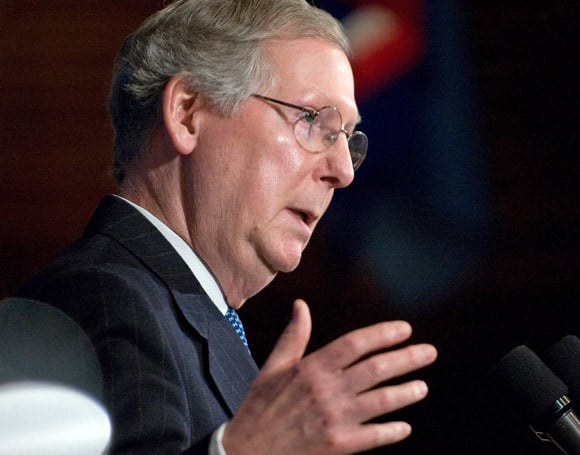Congress returned to work this week with a flurry of statements and posturing by political leaders regarding the soon-to-expire Bush administration tax cuts. The maneuvering likely sets the stage for a pre-election battle, rather than a compromise.
Congress returned to work this week with a flurry of statements and posturing by political leaders regarding the soon-to-expire Bush administration tax cuts. The maneuvering likely sets the stage for a pre-election battle, rather than a compromise.
Indeed, the possibility of an agreement between President Barack Obama and Republicans was dealt a substantial setback yesterday when Senate Minority Leader Mitch McConnell, R-Ky., introduced legislation that would freeze current tax rates. Such a move would preserve the tax breaks implemented in 2001 and 2003.
Equally important to financial advisers: The measure also includes an estate tax provision based on a proposal from Sen. Blanche Lincoln, D-Ark., and Sen. Jon Kyl, R-Ariz. That plan would set the estate tax rate at 35%, with a $5 million exemption that's indexed for inflation. The proposal would also provide a stepped-up basis for inherited assets.
Mr. McConnell's move seems to indicate that he's confident of keeping the 41 Senate Republicans together in the tax debate, which would give the caucus enough votes to sustain a filibuster against a Democratic bill. There's little chance Mr. McConnell could get 60 votes for his bill, however.
But Mr. McConnell asserts that five or more Senate Democrats agree with Republicans that all the Bush tax cuts should be renewed.
"What we ought not be doing is raising taxes on anybody in the middle of a recession," Mr. McConnell told reporters in a Capitol Hill news conference on Tuesday. "There's bipartisan agreement on that."
Most Democrats — including Mr. Obama — advocate renewing tax cuts for families making less than $250,000 while reinstituting higher rates on Jan. 1.for wealthier taxpayers. They argue that providing a tax cut for the well-off would add $700 billion to the deficit over 10 years.
Senate Majority Leader Harry Reid, D-Nev., did not say when he would introduce tax-cut legislation or schedule a vote.
"We're going to...come up with something reasonable on these tax issues," Mr. Reid told reporters at a Capitol Hill press conference on Tuesday.
Mr. Reid characterized Republicans as holding up middle-class tax cuts in order to secure "giveaways" for the rich.
"That's simply not just unfair to working Americans, it's bad economic policy," Mr. Reid said.
He didn't directly address whether there are Senate Democrats ready to side with the GOP on taxes.
"We're united as a Democratic caucus to cutting taxes for middle class Americans," Mr. Reid said.
But in addressing taxes during a Sept. 10 press conference, the President did note: “There is certainly going to be room for discussion.”
That statement was followed by remarks by House Republican Leader John Boehner, R-Ohio, on CBS-TV's “Face the Nation” over the weekend that he would vote for a strictly middle-class tax cut if it's “the only option” he has. Under House rules, the Democratic majority would not have to present an alternative bill that extends tax cuts for all income levels.
But hopes for a swift compromise on marginal tax rates may have been dashed by what Mr. McConnell has put forward, which pushes for the universal extension of current tax rates for all earners.
“No party can give any ground before the election and, therefore, we'll have a lot of theater,” said Clint Stretch, managing principal of tax policy at Deloitte Tax LLP. “I don't think there have been any fundamental changes in the dynamic.”
Lawmakers will be reluctant to cut a deal prior to the next congressional recess in early October because they want to see how election results affect party numbers. That means that any real legislating will have to wait until a lame-duck session in mid-November.
Dean Zerbe, national managing direct of the Alliantgroup, a specialty tax service, says the estate tax won't be addressed until after the November vote.
“That seems to be a lame-duck issue,” said Mr. Zerbe, former senior tax counsel on the Senate Finance Committee. “I'm a little worried it may carry into the new Congress [in January]. I think it's going to take an election to break the logjam.”
Mr. Zerbe anticipates that Congress will settle on a temporary “two-year patch” for the estate tax that would consist of a 45% rate and a $3.5 million exemption.
If Congress does not set a new estate tax rate by Dec. 31, it will revert to 55% with a $1 million exemption. If it does not act on the other Bush tax cuts, marginal rates will return to the higher levels of the late 1990s.
At this point, it's hard to predict what Congress will do. But given the state of the economy, it seems likely the House and Senate will renew tax cuts for the middle class before the year is out.
“If they expire at the end of this year, the withholding tables will have to change, and people will find they have less cash in their paychecks,” Mr. Stretch said. “It's going to be a disaster if they don't fix the middle class taxes. One would think [Congress] will resolve them.”







